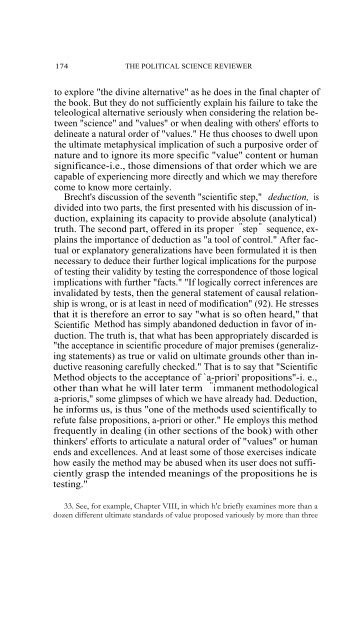ARNOLD BRECHT'S POLITICAL THEORY REVISITED Political ...
ARNOLD BRECHT'S POLITICAL THEORY REVISITED Political ...
ARNOLD BRECHT'S POLITICAL THEORY REVISITED Political ...
You also want an ePaper? Increase the reach of your titles
YUMPU automatically turns print PDFs into web optimized ePapers that Google loves.
174 THE <strong>POLITICAL</strong> SCIENCE REVIEWER<br />
to explore "the divine alternative" as he does in the final chapter of<br />
the book. But they do not sufficiently explain his failure to take the<br />
teleological alternative seriously when considering the relation between<br />
"science" and "values" or when dealing with others' efforts to<br />
delineate a natural order of "values." He thus chooses to dwell upon<br />
the ultimate metaphysical implication of such a purposive order of<br />
nature and to ignore its more specific "value" content or human<br />
significance-i.e., those dimensions of that order which we are<br />
capable of experiencing more directly and which we may therefore<br />
come to know more certainly.<br />
Brecht's discussion of the seventh "scientific step," deduction, is<br />
divided into two parts, the first presented with his discussion of induction,<br />
explaining its capacity to provide absolute (analytical)<br />
truth. The second part, offered in its proper " step " sequence, explains<br />
the importance of deduction as "a tool of control." After factual<br />
or explanatory generalizations have been formulated it is then<br />
necessary to deduce their further logical implications for the purpose<br />
of testing their validity by testing the correspondence of those logical<br />
implications with further "facts." "If logically correct inferences are<br />
invalidated by tests, then the general statement of causal relationship<br />
is wrong, or is at least in need of modification" (92). He stresses<br />
that it is therefore an error to say "what is so often heard," that<br />
Scientific Method has simply abandoned deduction in favor of induction.<br />
The truth is, that what has been appropriately discarded is<br />
"the acceptance in scientific procedure of major premises (generalizing<br />
statements) as true or valid on ultimate grounds other than inductive<br />
reasoning carefully checked." That is to say that "Scientific<br />
Method objects to the acceptance of `a-priori' propositions"-i. e.,<br />
other than what he will later term " immanent methodological<br />
a-prioris," some glimpses of which we have already had. Deduction,<br />
he informs us, is thus "one of the methods used scientifically to<br />
refute false propositions, a-priori or other." He employs this method<br />
frequently in dealing (in other sections of the book) with other<br />
thinkers' efforts to articulate a natural order of "values" or human<br />
ends and excellences. And at least some of those exercises indicate<br />
how easily the method may be abused when its user does not sufficiently<br />
grasp the intended meanings of the propositions he is<br />
testing."<br />
33. See, for example, Chapter VIII, in which h'c briefly examines more than a<br />
dozen different ultimate standards of value proposed variously by more than three
















